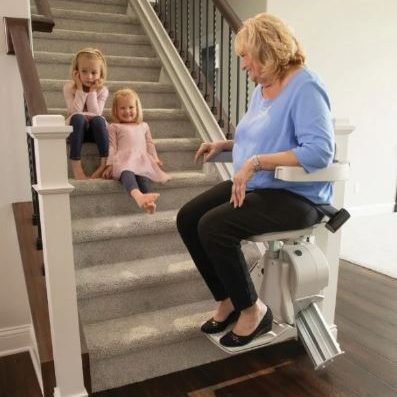Your qualified resource for your changing life and real estate needs.
SERVICES

READY TO BUY
Making an Emotional Purchase
Buying a new home when you’re 50+ can leave you with mixed emotions. On the one hand, a new beginning presents a lot of exciting opportunities. On the other, such a big change may overwhelm you with anxiety. An SRES® designee can help outweigh the negative emotions with the positive.
Buying with Confidence
Whether you know exactly what you want or are still sorting through the array of residential options for adults ages 50+, your SRES® helps you understand the best choices available to you. They sit down with you and your loved ones to discuss your needs, wants, and resources then outline a specific plan for you. The unique experience and training of an SRES® allows them to find properties, determine appropriate offers, and negotiate purchases on your behalf.
Tapping Into 50+ Expertise
SRES® designees have a deep well of resources that benefit you as an older buyer. A network of home inspectors, movers, attorneys, and CPAs experienced with adult buyers ages 50+ ensures the entire buying process, from purchasing to moving in, goes as smoothly as possible.
READY TO SELL
Simplifying the Selling Process
There are a lot of moving parts in action when selling your home. For adults ages 50+, the often complex process can be made more difficult due to physical and financial limitations, and the strong emotions connected to your family home. I will be at your side and can simplify selling your home every step of the way.
Five Essential Steps of Selling
-Pricing considerations
-Staging your home
-Showing your home
-Negotiating the sale and closing
-Packing and moving
-Pricing Considerations

The listing price of your home is often the first thing buyers notice. Setting the right price is an important first step. I will analyze your home, compare it to the local market, and consider your unique financial situation to arrive at a competitive selling price that benefits you and your family.
Staging Your Home
Price is one thing, but how you show off your home can be the difference between closing a deal and watching one walk away.
Staging your home means presenting it in the best light. Sprucing up the curb appeal, giving the inside a new shine. This usually takes place before the For Sale sign goes up. I know what buyers are looking for and can help you get your home looking its best.
Some ways to go about staging your home are:
-Light landscaping (weeding, trimming, mowing the lawn, etc.)
-Making necessary or cosmetic repairs (leaky faucets, sticky doors, etc.)
-Hiring a service to thoroughly clean attic-to-basement
-Rearranging rooms so they appear bigger
-Putting valued possessions in a safe place
The staging process can be stressful because you’re being asked to rearrange your home for the sake of someone else. I understand this can be emotional for you and your family, and will be at your side, supporting you all the way through.
Showing Your Home
There are two types of showings:
Open houses: Your home will be open for a few hours to REALTORS® and potential buyers. I will be present the entire time and require all visitors to sign in.
Individual showings: An agent brings prospective buyers into your home to show them around and discuss its features. The showing agent may not be me, but these showings are scheduled through me.
This part of the selling process is not usually experienced by the homeowner. Showing a home to prospective buyers while you’re present can put you in an awkward position of feeling forced to answer the buyer’s questions. And it can be uncomfortable for the buyer to discuss possible changes to the home without feeling like they’re insulting your taste. For this reason, I will likely ask you to be out of the home during a showing.
Individual showings are often scheduled on short notice, which means you have to quickly leave your home and occupy yourself for the duration of the showing. However, I understand that this can pose unique challenges for adults 50+. They take special consideration for your schedule and abilities. They can place specific times for showings in the listing if you prefer. And if you or a loved one living in the home is unable to leave, I can note that in the listing, too, and make arrangements to be present during individual showings.
I work with your best interests in mind and will adapt my business practices to meet your needs.
Negotiating the Sale and Closing
It’s exciting when an offer is made on your home. But sometimes, especially when it’s a buyer’s market—when sellers outnumber buyers—the offer may not be what you hoped. How do you know if the offer is reasonable and should be considered, and how do you begin negotiations?
I will be notified of the offer and present it to you. I understand the local market and am familiar with your needs so I am well equipped to help you determine if the offer should be accepted, declined, or if negotiations should begin.
Packing and Moving
Moving out of your family home can be overwhelming. Not just the organizational and physical parts but the emotional part, too. Old possessions can trigger a lot of memories making it difficult to decide what comes with you and what is given a farewell. Family members can help you through this process but sometimes a third-party specialist is what you need.
I can put you in touch with professional services that can:
-Determine how much can fit into a new home
-Help make decisions on what to keep and what to leave
-Manage the packing, moving and unpacking process
If you decide to handle the moving on your own, it’s recommended that you start organizing and packing sooner than later. Set small, achievable goals and break up the work to relieve any emotional stress you might experience.
I will be readily available to connect you with a senior moving specialist in your area. Or you can search on your own at the National Association of Senior Move Managers website, nasmm.org.

CONSIDERING SENIOR HOUSING
Planning for Your Future Needs
You may not feel like a senior but for adults 50+, a variety of housing options known as senior housing are available to you. These options cover a broad spectrum from active living communities to those providing full and continuous care. Your SRES® is available to help you navigate these senior housing options as you age paying great attention to cost, location, services, amenities, activities, and current and future care needs.
Independent Living
Condos, townhouses and single family homes that are smaller and more maintenance free than large family properties are frequently people's first choice, especially if they're healthy and active.
Active Adult Senior Retirement Homes and Communities
These homes and communities aim to service the interests of active adults over the age of 55. Housing types often include condos, townhouses and single-family properties, and all are designed to deliver a maintenance-free lifestyle. Such communities offer a vast array of on-site activities, including exercise, social clubs, art instruction, and lecture series.
Assisted Living Senior Retirement Homes and Communities
Residents live in their own apartments, but have the benefit of an on-site staff, meal service in communal dining spaces, and planned activities and outings. Some assisted living communities also offer access to nurses and daily living assistance. Others may offer more extensive medical and personal services.
Adult Family Senior Retirement Homes
Such properties are licensed to care for up to six residents in a home setting. Services typically include meals and housing maintenance, and attending to residents' safety and care. Facilities may specialize in addressing specific health concerns by providing care in an environment tailored to those conditions.
Alzheimer's and Dementia Care
People living with dementia require an ever-evolving approach to care. That care can be complex and become difficult for the family caregiver to manage on their own. Facilities specializing in caring for patients with dementia and Alzheimer's disease offer programs that address residents' needs and provide an environment where they can live safely.
Services typically include:
- Personal care like bathing and dressing
- Administering medicine
- Dining
- Housekeeping
Many of these facilities incorporate safe wandering paths and color coded areas to help with way-finding. Such designs provide comfort and ease residents' anxiety.
Continuing Care Retirement Living Communities
These communities offer progressive levels of assistance, depending on a person's needs. They include independent and assisted living as well as nursing care. This allows residents to change the care provided to address the care they need without having to go through a dramatic move.
ADAPTING YOUR HOME
Most of us would prefer to age in our current home. But as health and aging issues make more areas of the home hard to access or pose a greater risk of injury, doing so can be difficult. We can begin to feel trapped and that selling our home is the only option. It’s not. Adapting your home to meet your aging needs is something I can help with when the time comes.
If health issues require you to move in with an adult child or any other loved one, I will be there to help them with making the appropriate modifications to their home as well.
Potential Risks and Difficulties
You might know every corner, creaky floorboard, and exactly where every light switch is in your home, but at some point, familiarity turns to risk and everyday tasks become harder to manage. Knowing those potential risks and difficulties can help determine when adapting your home is necessary.
- Raised thresholds
- Bathrooms
- Area rugs
- Stairs
- Doorknobs becoming difficult to turn
- Cabinets and shelves become harder to reach

Certified Aging-In-Place Specialists
A certified aging-in-place specialist (CAPS) is a professional who can evaluate the home, find problem areas, and suggest the right home modifications. The answer may be as simple as adding grab bars in bath areas, flattening thresholds, and installing brighter lighting, for example. However, two-story living may require more significant remodeling to overcome these unique challenges.
Whatever the potential risks and difficulties are, a CAPS will advise on which changes will be the most beneficial and suggest cost-effective solutions.
Certified aging-in-place specialists are trained in:
- The unique needs of the 50+ population
- Home modifications
- Common remodeling projects
- Solutions to common barriers
